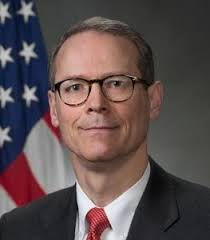Annual Polling Confirms Sustained Public Confidence in U.S. Intelligence
The Chicago Council on Global Affairs recently published results from the second round of an annual poll, sponsored by the Texas National Security Network at the University of Texas at Austin, which aims to shed light on Americans’ perceptions of the intelligence community. The data collected in 2018—including survey methodology and limited policy analysis—are available here.
Published by The Lawfare Institute
in Cooperation With

The Chicago Council on Global Affairs recently published results from the second round of an annual poll, sponsored by the Texas National Security Network at the University of Texas at Austin, which aims to shed light on Americans’ perceptions of the intelligence community. The data collected in 2018—including survey methodology and limited policy analysis—are available here. The baseline survey, conducted in 2017, was reported last year in “Glasnost for U.S. Intelligence: Will Transparency Lead to Increased Public Trust.”
This second round of polling, which we led at the University of Texas at Austin, confirmed a modest increase in Americans’ assessment of the intelligence community’s utility and effectiveness, notwithstanding persistent expressions of hostility and distrust by the president. Starting before his inauguration, President Trump vigorously rejected the intelligence community’s consensus judgment on Russia’s interference in the 2016 elections, and since then he has repeatedly attacked these agencies and their former leaders. In 2018, the president went so far as to accuse the intelligence community of spying on his 2016 campaign, and his supporters labeled it as an anti-democratic “deep state” hostile to his administration.
But despite the unprecedented public antagonism from the chief executive, most Americans, including Republicans, continue to express confidence in the intelligence community. Indeed, survey results from summer 2018 show a slight improvement from 2017 in public views of the community’s effectiveness.
With two years of survey data available, we can begin to develop a more reliable understanding of the American public’s attitudes toward the country’s intelligence agencies. Most Americans regard the intelligence community as vital to national security and its performance as increasingly effective—in particular, in preventing terror attacks. But the public does not have a good understanding of how the intelligence agencies are supervised and how oversight is exercised.
While the trend lines that emerged between 2017 and 2018 were generally positive for the intelligence community, knowledge about—and support for—U.S. intelligence is weakest among younger Americans. Millennials, the youngest generational cohort analyzed here, are less likely to see the intelligence community as playing a vital role in warning against foreign threats or even to regard it as effective in preventing terrorist attacks.
Below is a brief overview of our findings:
- Once again, a strong majority of Americans (59 percent) said the intelligence community plays a vital role in protecting the country, including 60 percent of Republicans. Larger percentages of Americans belonging to the Silent Generation (78 percent of those born between 1928 and 1945) expressed this view in 2018, compared to 67 percent of Boomers (1946-1964), 58 percent of Gen X-ers (1965-1980), and only 47 percent of Millennials (1982-1996).
- An overwhelming majority of Americans regarded the intelligence agencies as effective in accomplishing their assigned missions, with nearly eight in 10 crediting the intelligence community for preventing terrorist attacks.
- Only half of Americans (51 percent) believe the intelligence community effectively safeguards their privacy and civil liberties while pursuing its mission.
- Almost all Americans (89 percent) agreed that the intelligence community should use all lawful means to gather intelligence. But the number of Americans who believe the intelligence agencies should respect the rights of foreigners to the same degree as U.S. citizens grew by 15 percentage points from 2017 to 2018, from 38 percent to 53 percent.
- The overall number of Americans who agreed the intelligence community could share more information with the public without compromising its effectiveness increased from 2017, rising from 54 percent to 65 percent. This view was shared by nearly seven in 10 Millennials.
- Americans remain divided over which government officials or institutions should be responsible for supervising and overseeing the intelligence agencies.
Our baseline survey in 2017 revealed considerable uncertainty among the public about which government officials or institutions should be responsible for overseeing intelligence agencies.
The 2018 survey reflected the same uncertainty regarding democratic oversight of U.S. intelligence. Roughly equal numbers of respondents in both 2017 and 2018 identified the National Security Council (NSC), individual agency heads, Congress and the courts as those that should be responsible for monitoring the intelligence agencies. The proportion of respondents who associate the media with this task was stable at near 5 percent. Support for the NSC’s role in supervising intelligence activities decreased slightly, but it remained the most popular choice among those polled in 2018. Some 15 percent of respondents—an increase of four percentage points—now believe the president should be responsible for ensuring that U.S. intelligence agencies “act within the law and in the country’s best interest.” This increased support for the chief executive’s primacy over U.S. intelligence was most pronounced among Republican and male respondents.
The main goal of this project is to supplement anecdotal assessments of public support for the intelligence community with more reliable evidence of that relationship. The last two directors of national intelligence (and many agency heads) have asserted a connection between transparency, public understanding, and popular support—and our polling data should also help test this proposition, albeit imperfectly. Our current survey captures public attitudes, though we did not ask respondents why they held certain views about U.S. intelligence or what might cause them to think differently.
Identifying the cause of the public’s increasingly favorable attitude toward U.S. intelligence is particularly fraught at this moment. In the 12 months between our surveys, Americans debated the merits of the January 2017 Intelligence Community Assessment of Russian attempts to interfere in the previous year’s presidential election. The director of national intelligence and several intelligence community agency heads also appeared in well-publicized open hearings convened by the congressional intelligence committees, where they explained and fielded questions on the intelligence community’s yearly Worldwide Threat Assessment.
At the same time, however, the president, members of his administration, and pro-Trump media outlets were challenging the Intelligence Community Assessment’s main judgments (along with the competence of its authors), consigning the intelligence agencies to an anti-democratic “deep state” and threatening to revoke the security clearances of disfavored former intelligence officials. On the world stage, Trump pointedly rejected the intelligence community’s judgments on foreign election interference in favor of the Russian president’s “strong and powerful” denials.
It is tempting to conclude that the intelligence community’s efforts to be more open are inspiring public confidence, or that the president’s attacks on the intelligence agencies are unserious and ineffectual, but neither conclusion is yet supported by survey evidence. In the meantime, we will continue to annually measure the public’s confidence in U.S. intelligence and document any significant changes in these attitudes.






